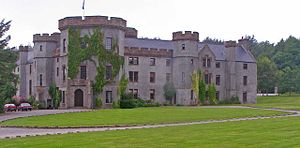Fetteresso Castle
| Fetteresso Castle | ||
|---|---|---|
|
Fetteresso Castle |
||
| Creation time : | 14th century / from 1671 | |
| Conservation status: | restored | |
| Geographical location | 56 ° 57 '37.4 " N , 2 ° 15' 37.4" W | |
|
|
||
Fetteresso Castle is a former 14th century residential tower that was converted into a Palladian mansion of the Scottish Gothic in 1671 . It stands just to the west of the town of Stonehaven in Kincardineshire . Other notable historic estates and castles in the area include Dunnottar Castle , Muchalls Castle , Fiddes Castle , Cowie Castle , Ury House and Monboddo House .
history
middle Ages
There is written evidence that the area of the later Fetteresso Castle once belonged to the Strachans . In the 14th century, the Earls Of Marischal ( Clan Keith ) married into the family and came into possession of the land on which they built a stone tower block. The Earls of Marischal also owned the nearby fortress of Dunnottar Castle.
Modern times
In this era, the Scottish stepped gables , characteristic of this area , developed, and battlements were built on fortified walls. In the 17th century, a dovecote of considerable size was built on the southern part of the castle .
Towards the end of the century, the Duff family took control of the property and generously expanded the building around the old residential tower.
In the 1940s the castle was owned by the couple Maurice and Geraldine Simpson (nee Pringle). Geraldine Simpson was the heiress of the famous luxury clothing manufacturer Pringle of Scotland and was accordingly wealthy. So after a while they also took over the neighboring Muchalls Castle, to which they later moved.
After the Simpsons left Fetteresso, the roof of the castle was removed around 1954. This was a not uncommon measure of saving money at the time. Because the tax policy in Great Britain required that a so-called "property tax" had to be paid on every building with a roof. So you simply removed the roofs of your unused buildings without further ado and the tax was no longer applicable. The removal of the roof also had a symbolic value, namely as a protest against this tax.
A short time later, a local landowner bought the castle, which he bequeathed to the Don family after his death. They invested a lot of money in the renovation, modernization and, last but not least, in equipping the property. Fetteresso Castle is privately owned, which is why it is not open to the public.
Web links
Individual evidence
- ↑ a b c Fetteresso Castle on Scotland signpost , refers to the whole article.

